The Teacher's Guide to Grand Canyon Student Trips: Free Rangers, Fossil Hunts, and Desert Wildlife Discovery
- Caleb Mullenix
- Nov 3, 2025
- 6 min read
Updated: Nov 6, 2025
Ensuring your students experience the Grand Canyon's unparalleled scientific learning opportunities requires careful planning and strategic coordination with the National Park Service's exceptional educational programs. The Grand Canyon offers one of the most comprehensive hands-on science learning environments in North America, where students can explore 2 billion years of geological history, discover ancient fossils, and observe unique desert ecosystems in their natural habitat.
Planning a successful student trip to Grand Canyon involves understanding three critical components: leveraging free ranger-led programs, maximizing fossil discovery opportunities, and creating meaningful wildlife education experiences. This comprehensive guide provides the essential framework for organizing an educational trip to Grand Canyon that transforms textbook concepts into tangible scientific discoveries.
Accessing Free Ranger-Led Educational Programs
Begin by contacting the National Park Service Education Team 6-12 months in advance to secure ranger-led programs for your school trip to Grand Canyon. The park offers specialized educational experiences designed specifically for students in grades 3 through 8, with programs that directly support state science standards and provide expert-led instruction at no additional cost.
Essential Ranger Programs for Science Education:
Geo-Glimpse Program: Students explore the Yavapai Geology Museum while learning fundamental geological concepts through interactive demonstrations and real rock sample examinations
Fossil Walk Program: A moderate 1/2-mile hike along exposed fossil beds where students discover marine creature remains from ancient ocean environments
Condor Talk Program: 45-60 minute educational sessions focusing on endangered species conservation and the California Condor reintroduction efforts
Evening Cultural and Natural History Programs: In-depth explorations of canyon formation, ecosystem relationships, and indigenous cultural connections
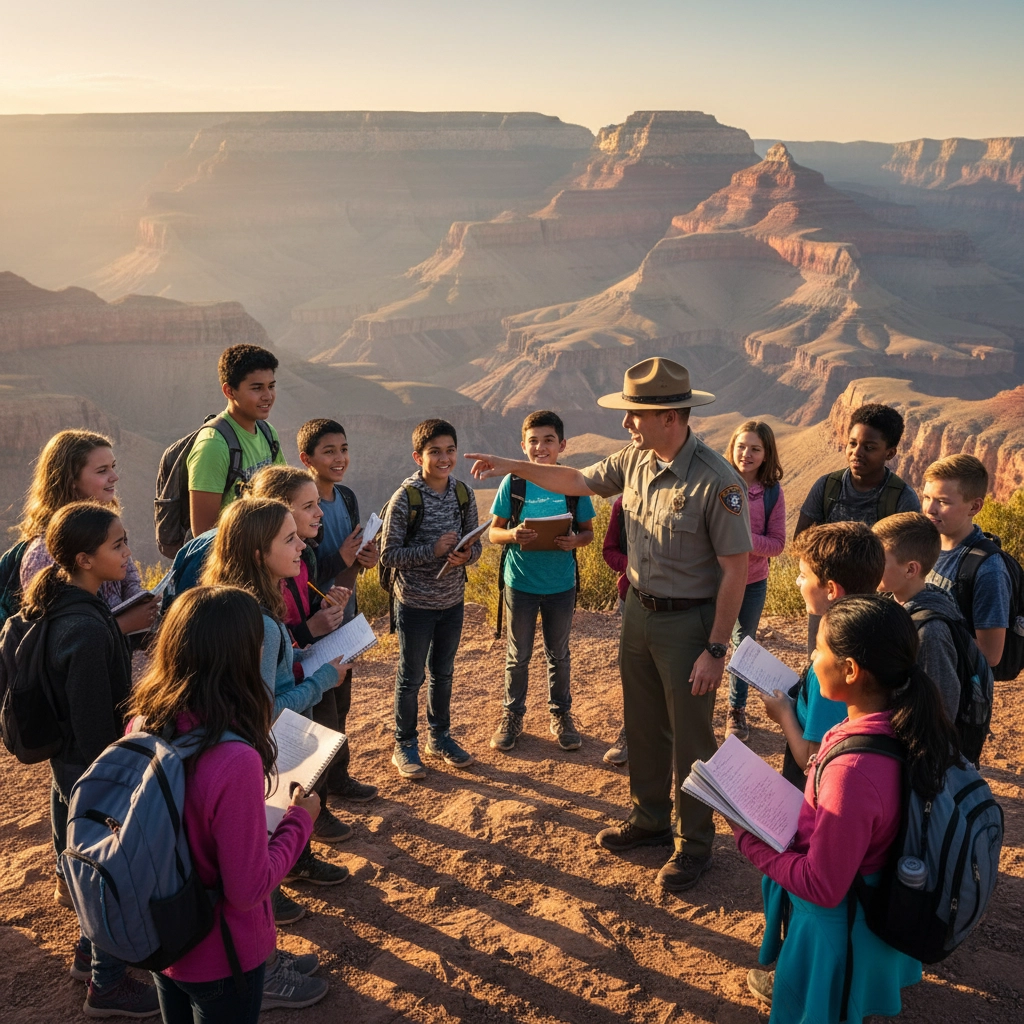
Create a detailed timeline for program reservations, ensuring you submit educational fee waiver requests through proper channels and obtain written confirmation for all ranger-led activities. Establish clear communication with park education coordinators regarding specific learning objectives, student age ranges, and any special accommodations needed for your group.
Maximizing Fossil Discovery and Geological Learning
The Grand Canyon presents exceptional opportunities for hands-on geological education through direct fossil exploration and rock layer analysis. The canyon's 1,500-meter depth reveals geological history spanning 2 billion years, making it one of the finest examples of arid land erosion and geological processes available for student study.
Fossil Hunt Planning Strategies:
Schedule the Fossil Walk Program: Reserve this essential program that operates daily from April 15 onwards, providing 1-1.5 hours of guided fossil bed exploration
Prepare Pre-Visit Geological Context: Introduce students to geological time scales, fossil formation processes, and the ancient marine environments that once covered the Grand Canyon region
Develop Fossil Discovery Documentation: Create field journals for students to record fossil observations, sketch discoveries, and document geological layer variations
Coordinate with Curriculum Standards: Align fossil hunting activities with earth science standards covering geological processes, evolutionary evidence, and environmental change over time
The exposed fossil beds along the rim trail allow students to walk through areas that were once ancient ocean floors filled with marine creatures. Students gain direct experience studying desert landscapes, erosion patterns, and the geological processes that shaped one of Earth's most remarkable natural formations.
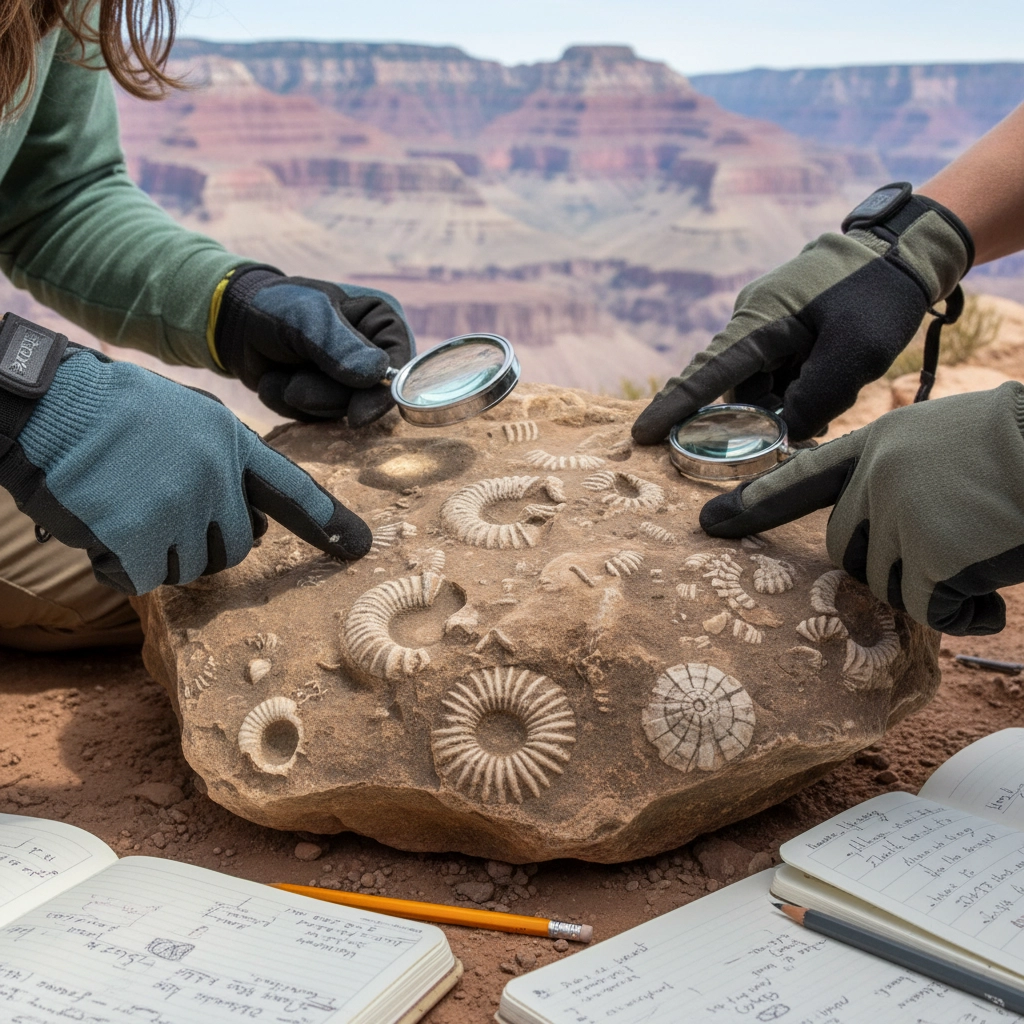
Desert Wildlife Discovery and Ecosystem Education
Establish comprehensive wildlife education objectives that emphasize the unique adaptations required for survival in high desert environments. The Grand Canyon's diverse ecosystems support species ranging from desert bighorn sheep to California condors, providing exceptional opportunities for students to observe wildlife behavior and understand ecological relationships firsthand.
Wildlife Education Implementation Steps:
Morning Wildlife Observation: Schedule early morning activities when desert animals are most active, before extreme heat affects animal behavior
Condor Conservation Focus: Participate in ranger-led Condor Talk programs to understand endangered species recovery efforts and conservation challenges
Desert Adaptation Studies: Guide students in observing and documenting wildlife adaptations for water conservation, temperature regulation, and food procurement in arid environments
Ecosystem Relationship Mapping: Help students identify predator-prey relationships, food webs, and habitat dependencies within canyon ecosystems
Document wildlife sightings through photography and detailed observation logs, emphasizing scientific observation skills and data collection methodologies. Encourage students to compare desert wildlife adaptations with species from their home environments, reinforcing understanding of environmental influence on evolutionary development.
Strategic Trip Planning and Preparation
Begin comprehensive planning 6-12 months in advance to ensure optimal educational outcomes and seamless coordination with school administrative requirements. Successful educational trips to Grand Canyon require meticulous attention to logistics, safety protocols, and curriculum alignment to maximize learning opportunities while maintaining student safety and engagement.
Essential Planning Timeline:
6-12 Months Before Travel:
Contact National Park Service Education Team for program reservations
Submit educational fee waiver requests and transportation coordination
Establish preliminary budget and secure school administrative approval
Begin parent communication and permission slip collection
3-6 Months Before Travel:
Finalize ranger program confirmations and create detailed itinerary
Coordinate with school transportation departments and establish emergency protocols
Develop pre-visit curriculum activities and learning objectives
Organize chaperone recruitment and training sessions
1-3 Months Before Travel:
Distribute comprehensive packing lists and weather preparation guidelines
Conduct parent information meetings and emergency contact verification
Prepare student safety briefings and behavioral expectations
Coordinate with food service and accommodation providers
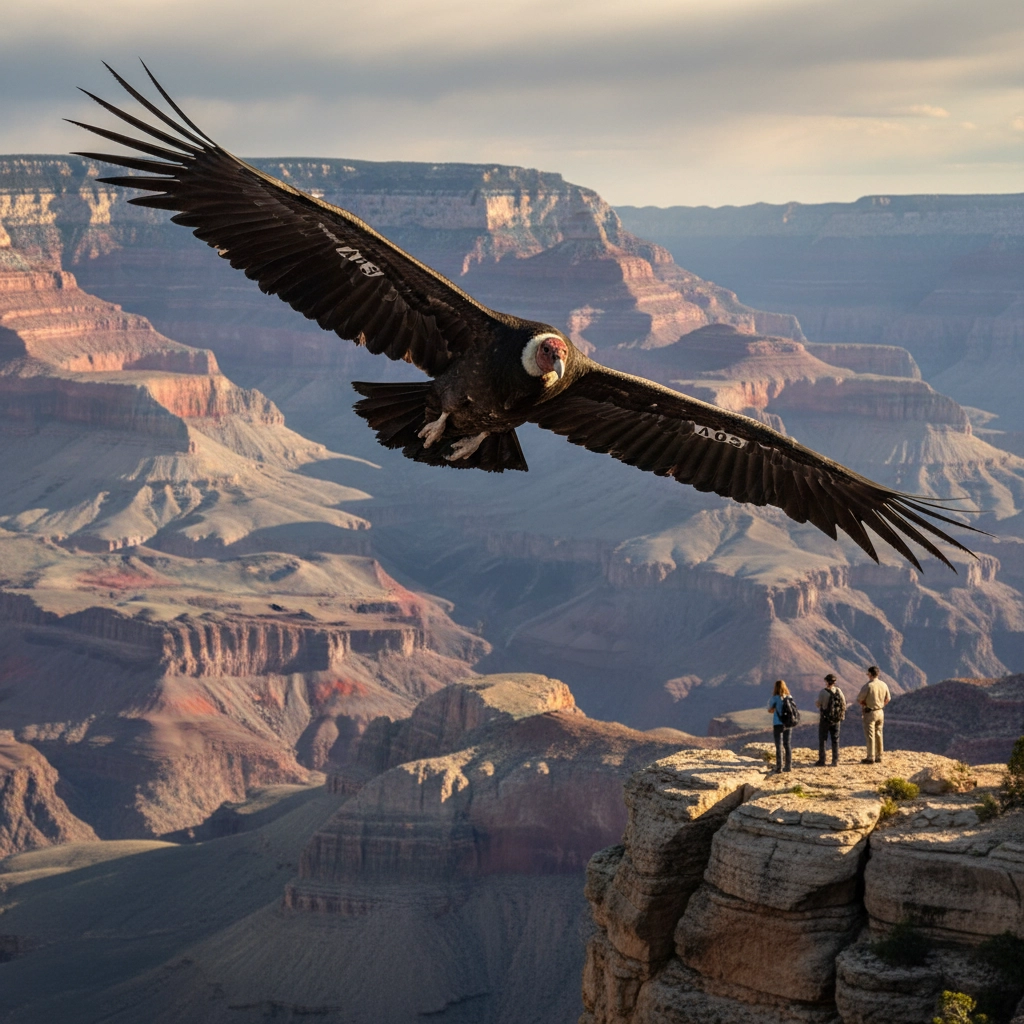
Weather Preparation and Safety Protocols
Emphasize the critical importance of weather preparation for Grand Canyon conditions, where temperature variations between rim and inner canyon locations can exceed 40 degrees Fahrenheit. Summer temperatures in inner canyon areas frequently exceed 100°F while rim temperatures remain moderate, requiring strategic clothing and hydration planning.
Essential Weather Preparation Requirements:
Layered Clothing Systems: Require warm layers for early morning and evening temperatures, light-colored clothing for sun protection during midday activities
Sun Protection Equipment: Mandate wide-brimmed hats, high-SPF sunscreen, and UV-protective sunglasses for all participants
Hydration Management: Provide each student with refillable water bottles and establish regular hydration breaks throughout all activities
Emergency Weather Protocols: Develop contingency plans for extreme weather conditions, including lightning safety procedures and heat illness prevention
Winter conditions may include snow at higher elevations, particularly affecting North Rim access from mid-October through mid-May. Ensure all participants understand weather-related safety protocols and emergency communication procedures before departure.
Curriculum Integration and Learning Assessment
Develop comprehensive pre-visit and post-visit activities that integrate seamlessly with existing science curriculum standards. The Grand Canyon supports interdisciplinary learning across geology, ecology, geography, and environmental science, providing opportunities for cross-curricular connections and extended learning projects.
Pre-Visit Preparation Activities:
Geological timeline construction using Grand Canyon rock layers
Ancient marine ecosystem research and fossil formation studies
Desert ecosystem adaptation investigations and species identification guides
Conservation challenge analysis focusing on endangered species recovery efforts
Post-Visit Assessment Strategies:
Detailed reflection journals documenting scientific observations and discoveries
Research projects investigating specific geological or ecological concepts encountered during the trip
Presentation development sharing learning outcomes with other classes or school communities
Creative assignments connecting Grand Canyon experiences to broader environmental science concepts
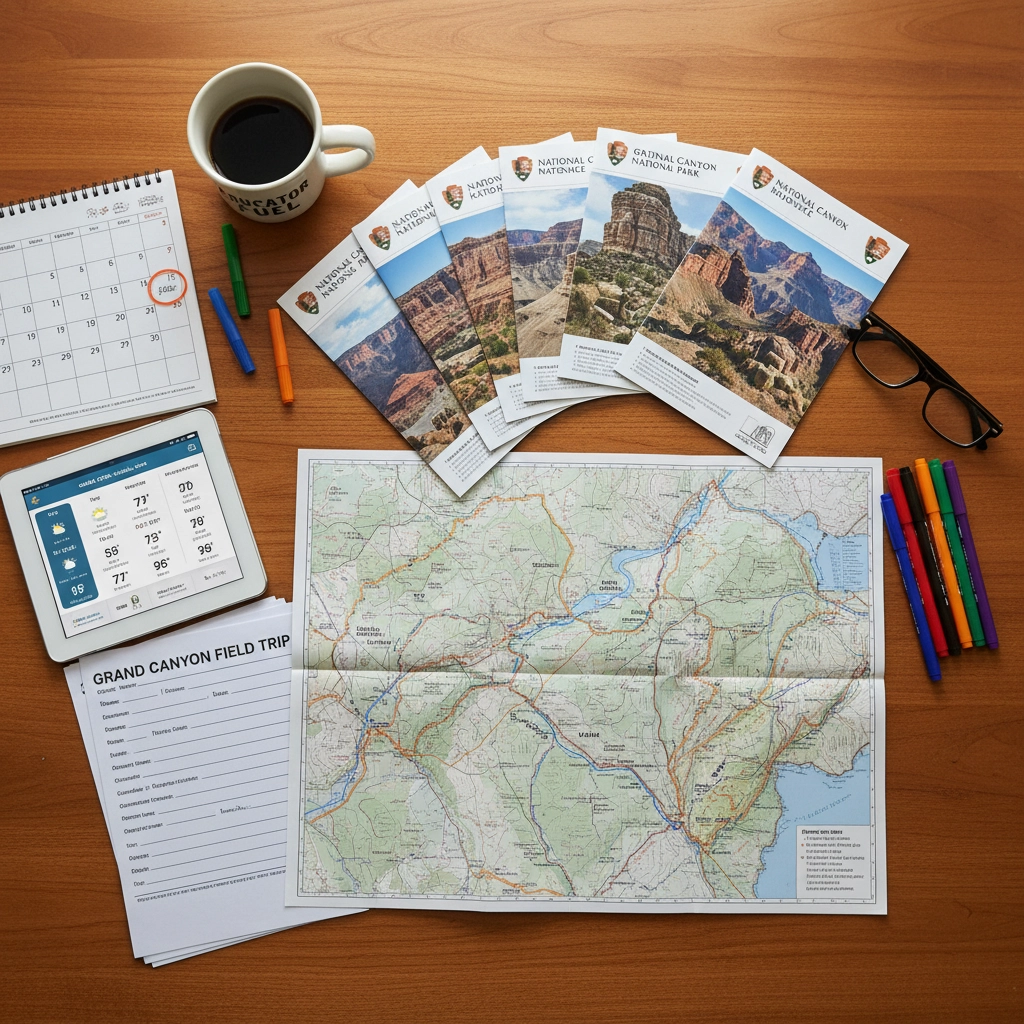
Chaperone Coordination and Group Management
Conduct thorough chaperone preparation through comprehensive pre-trip meetings that outline specific responsibilities, safety protocols, and educational support expectations. Effective group management during science-focused activities requires clear role assignments and proactive safety monitoring to ensure optimal learning conditions.
Chaperone Responsibility Framework:
Safety Monitoring: Assign dedicated chaperones for continuous student supervision during fossil hunts, wildlife observation, and rim trail activities
Educational Support: Train chaperones to assist with scientific observation documentation and learning objective reinforcement
Emergency Response: Establish clear emergency communication procedures and assign specific roles for medical situations or weather-related challenges
Group Coordination: Implement color-coded identification systems and designated meeting points for efficient group management
Provide all chaperones with emergency contact information, detailed itineraries, and specific protocols for managing student behavior during ranger-led programs and independent exploration activities.
Maximizing Educational Impact Through Expert Partnership
Partner with experienced educational travel specialists who understand the unique requirements of science-focused Grand Canyon student trips. Professional expedition coordinators provide essential support for complex logistics, safety management, and curriculum integration that maximizes educational outcomes while minimizing administrative burden on educators.
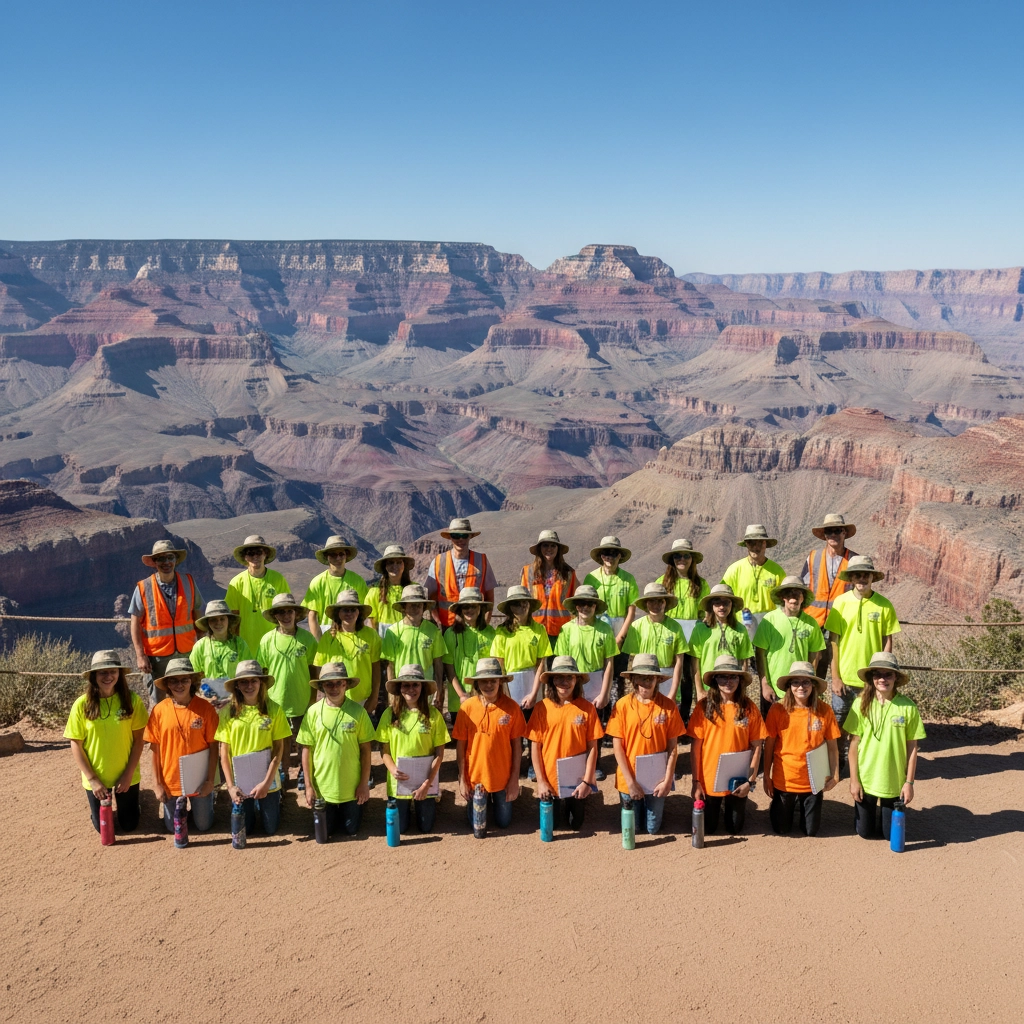
Consider collaborating with Appleseed Expeditions to access comprehensive Grand Canyon educational trip planning services that include pre-arranged ranger programs, specialized transportation coordination, and expert guidance for science curriculum integration. Professional educational travel partners provide the expertise and resources necessary to transform your Grand Canyon student trip into an exceptional learning experience that inspires scientific curiosity and environmental stewardship.
Comprehensive planning, strategic preparation, and expert coordination ensure your school trip to Grand Canyon delivers transformative educational experiences that reinforce classroom learning while inspiring lifelong scientific curiosity and environmental awareness. Through careful attention to safety protocols, curriculum alignment, and educational partnership, your students will gain invaluable hands-on experience with geological processes, fossil discovery, and desert ecosystem relationships that enhance their understanding of earth science concepts for years to come.



Comments